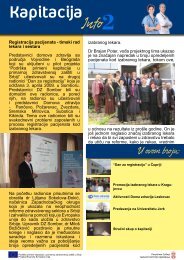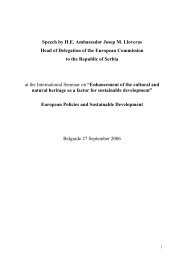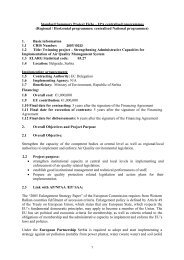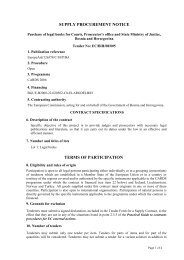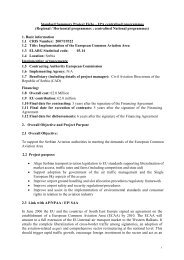YOUR SCHOLARSHIP IN EUROPE
YOUR SCHOLARSHIP IN EUROPE
YOUR SCHOLARSHIP IN EUROPE
Create successful ePaper yourself
Turn your PDF publications into a flip-book with our unique Google optimized e-Paper software.
72<br />
Your Scholarship in Europe 2008-2009<br />
Germany<br />
BASIC <strong>IN</strong>FORMATION ABOUT GERMANY<br />
Germany is located in North Central Europe, on the Great North European Plain. It is bound<br />
by Austria, Belgium, the Czech Republic, Denmark, France, Luxembourg, the Netherlands,<br />
Poland and Switzerland. The capital of the country is Berlin. The population (82.5 million<br />
in 2005) is almost entirely Germanic with Germans accounting for 94.4%. Ethnic minorities<br />
include Danes, Greeks, Italians, Serbs, Slovaks, Spanish, and Turks. Germany is a federal<br />
republic. Its federal government is based in Berlin. The Federal Government consists of the<br />
Federal Chancellor and the Cabinet of Federal Ministers. The Federal President has mostly<br />
ceremonial duties. In addition, there are sixteen state governments and thousands of local<br />
government communes. Each state has its own constitution and a state parliament.<br />
THE HIGHER EDUCATION SYSTEM<br />
Germany has a long tradition in education, science and research. There are 337 higher educational<br />
institutions located throughout Germany. Those interested in studying in Germany can<br />
choose between universities and university-status institutions, such as the technical universities,<br />
the universities of applied sciences (Fachhochschulen), or the colleges of art, music and<br />
fi lm. All state higher educational institutions are open to students of all nations.<br />
THE UNIVERSITY<br />
German universities are not merely institutions which provide education and training, they are<br />
invariably also the places at which independent, pure and applied research is pursued. University<br />
departments offer the following study courses: medicine, science, engineering, arts<br />
and humanities, law, theology, economics and social sciences, and agriculture and forestry.<br />
TECHNICAL UNIVERSITIES<br />
Originally, and as the name implies, technical universities restricted their teaching to<br />
technical and engineering disciplines. However, over the years, they have developed<br />
into more comprehensive higher educational institutions. Hence, students can now also<br />
take arts and humanities degree courses at technical universities. Nevertheless, the<br />
focus of their activities continues to be directed towards engineering and science.<br />
UNIVERSITIES OF APPLIED SCIENCES (FACHHOCHSCHULE)<br />
Students are increasingly taking courses at any of Germany’s universities of applied<br />
sciences, particularly since the programmes are shorter and have a more practical<br />
focus than in university courses with their greater research orientation.




